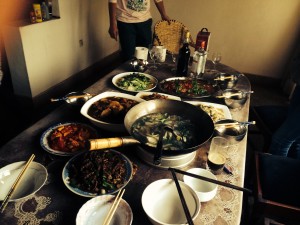Learning Chinese in Rwanda: Obscurity meets Obscurity
“If you don’t finish the glass, you will have insulted my family's honor” Oh no. This again.
Just when I thought I’d escaped lunchtime drinking with Chinese men. It was back. And this time, it was in Rwanda. I would need something quick to escape this request. Something, no man could ignore. My eyes danced around the table. Desperation began to sink in. “Oh look!,” I exclaimed “A plate of CAULIFLOWER”. Perfect. Mr. Kong - clearly moved by my love of collared greens - began to lower his rice wine, and reach for the distant dish.
You see, when I arrived in Rwanda, I gave myself a couple of goals. For one, I wanted to explore East Africa. I’d never been to the continent and I wanted to take advantage of the privilege I’d been given. Second, I wanted to create close friendships with the people I met. (An endless goal). And finally, I wanted to learn Chinese. Now, the final goal superficially sounds ridiculous. And, to be fair, Africa isn’t exactly a Mecca for Mandarin. Nonetheless, practicing Chinese is something I’ve loved doing over the past three years and something I want to do regardless of where I am. So, when I arrived in Kigali I had a two-part mission: 1. Find an innocent Chinese man or woman and 2. Demand that he/she have a nice dinner with me. And after weeks of google, email, and increasingly desperate posts on Rwandan Expat forums, I found it: The Confucian Institute of Kigali.
Mr. Kong was the first teacher to greet me. A man more mischevious than anyone over the age of 40 has the right to be - he shook my hand, and quickly ushered me inside. His sly grin fell, however, when I asked about Chinese class. They weren’t open. But, if I really wanted, I could come ask him questions on Monday evenings and have lunch at his house that weekend. And so, that’s what I’ve done for the past four weeks. Every Monday, I go to the Confucian Institute with a large list of questions, and most weekends I’ll spend a couple of hours enjoying an absurdly diverse Chinese feast. (See Above)
Before I arrived in Rwanda, I thought I would have to give up Chinese. Practicing wouldn’t be convenient, easy, or readily available. But, before I arrived, I realized that learning Chinese was important to me. So, I made sure that it would happen. A friend of mine told me “You have to impose your will upon life, or life is going to impose its will upon you”. And that’s something I believe deeply. If you want your life to be a certain way - you have the responsibility to shape it. For me that was finding Chinese friends and mildly coercing them to practice with me a couple of times a week. For you, that could be spending wednesday nights reading, or finally forming that spice girls cover band. Most of the exciting possibilities of life are obscure. But that gives us no permission to avoid them - or believe we’re not worthy of trying. Instead, we have to embrace obscurity because often it means we’re doing what we choose and not what we are easily given.
In Chinese there is an saying “When saving a dead horse, act as if he is alive” ( "死马当活马医”)
or “When you pursue the unlikely. You must act as if it is reality.”
And hey.
I’d cheers to that.
